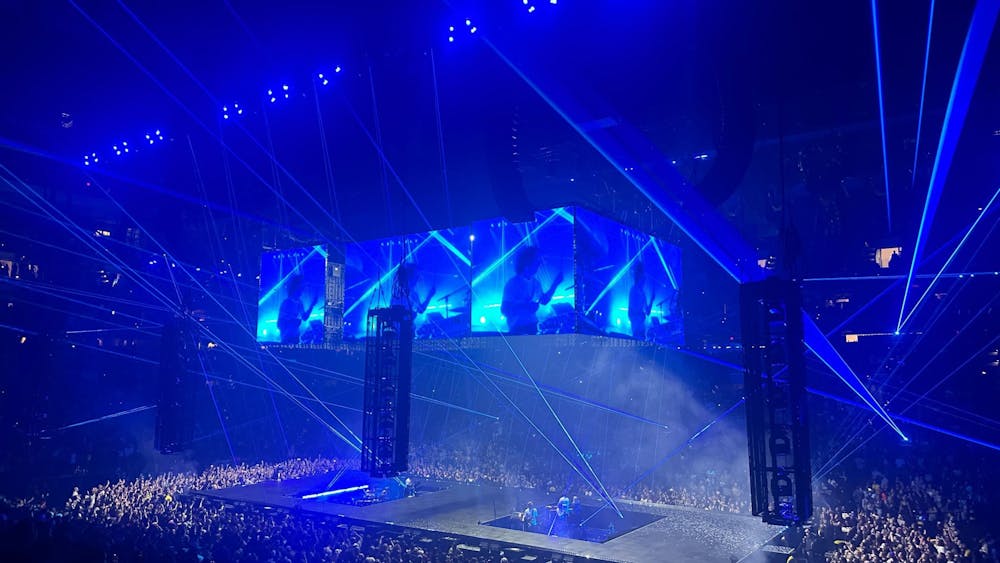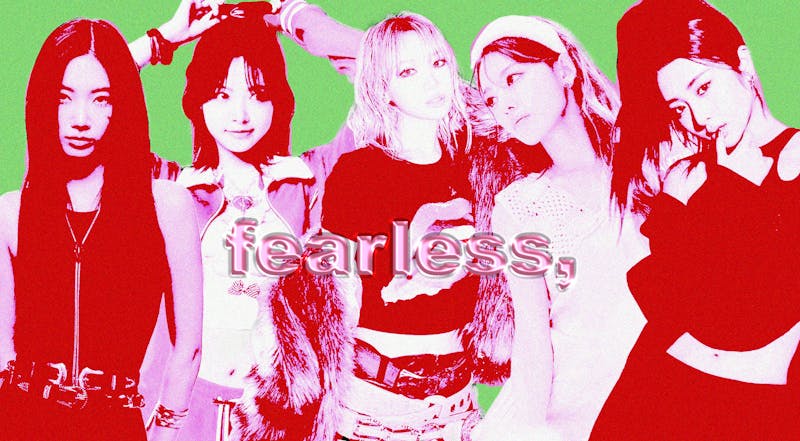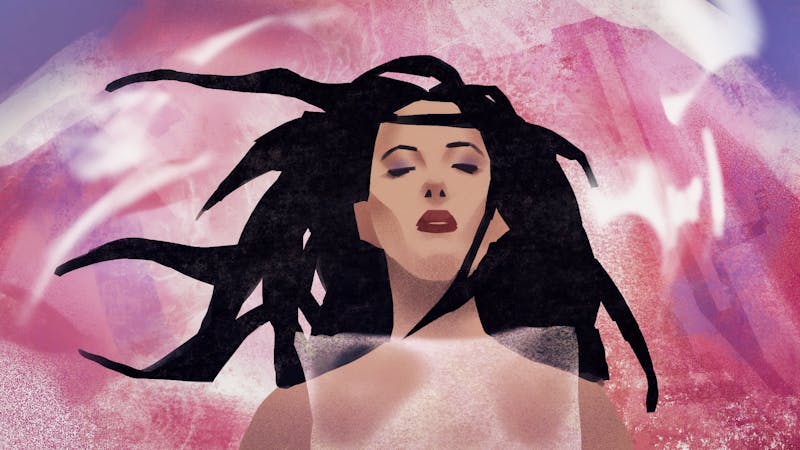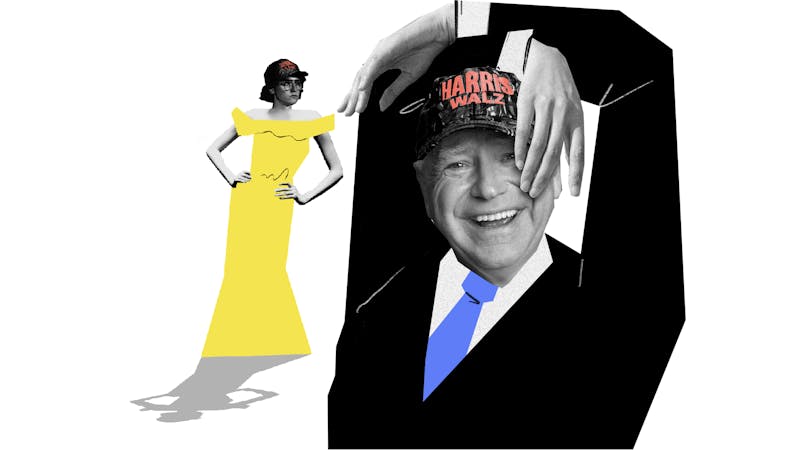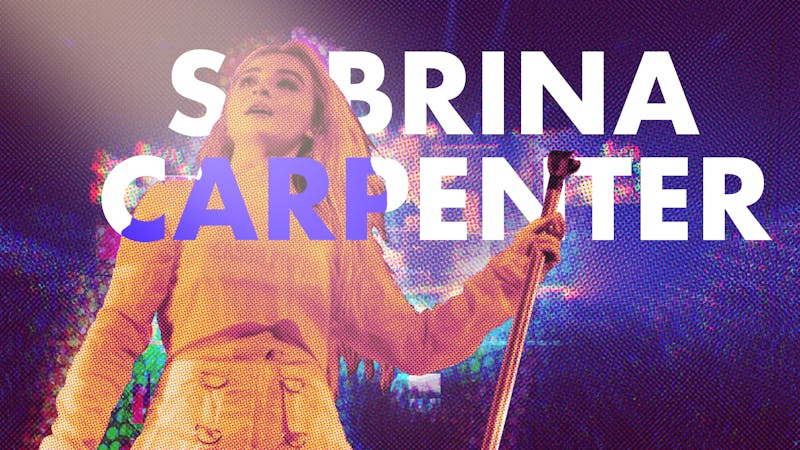The night of Saturday, Oct. 5 hit me hard … and soft. As I clambered into my seat amidst a crowd of screaming bisexuals, I wondered vaguely how I could have been enjoying my fall break at home just two hours ago. Somehow, here I was at the Wells Fargo Center … in Philadelphia, again. But I was "Happier Than Ever" to be in my city when Billie Eilish purred into her mic: “Hey, Philly, you seem like you’re feeling pretty good.”
“Feeling pretty good” is an understatement. The crowd was ecstatic when Eilish swaggered onstage in a Sixers jersey, a combination beanie/backward baseball cap, and a loose braid. Eilish is exceptionally beautiful in person: all dark hair, light eyes, and high cheekbones. Several audience members audibly gasped when her face appeared projected on the big screen, cast with blue light and accentuated with dark shadows, at the beginning of the opening number “CHIHIRO.”
And her voice. Equally gorgeous live as it is recorded (if not more so), her unique soprano is just as capable of a gravelly mixed–chest register as it is of ascending ethereally to the heavens. And she wasn’t shy when it came to showing those high notes off: Eilish really flexed her vocal chops during “when the party's over”, for which she live–recorded the a cappella intro with a looper. But live–recording wasn’t the only gimmick Eilish pulled Saturday night. The Hit Me Hard and Soft tour, like the album itself, felt like an attempt at a masterpiece, a great work … a concerto, if you will. But unlike the album, which many critics consider to have flopped precisely due to its insistence on extravagance, the tour was successful in achieving a sense of grandiosity, replete with tongues of flame, confetti, floating platforms, and swinging underwear. It was obvious that Eilish wanted to go all out for this tour, and go all out she did.
But somehow, none of the flamboyance of the Hit Me Hard and Soft tour took away from its gentler moments. And it is this—the healthy co–existence of experimental hyper–pop and lyrical vulnerability—that defined the night. In one concert, Eilish achieved what she's been attempting artistically for years. Eilish’s appeal is dependent upon her ability to mediate two extremes: defending her bedroom pop roots, but also churning out catchy bangers for the stadiums. Upon her debut, Eilish immediately established herself as a member of the relatability vanguard (you know, those girls with guitars and lots of feelings who seem to know exactly the right words to express them), but she has since proved her worth as a radio artist with frequent Top 100 hits. As she has been asked to step out of her comfort zone for commercial purposes, Eilish has started to excavate a gray area in what before appeared to be a black–and–white industry: studio versus acoustic, pop versus indie, lead single versus deep cut. By blending ethereal vocals with heavy guitar, or sweet lyricism with syncopated backbeats, Eilish has developed a sense of fluidity that sets her apart from her peers and challenges the understanding of modern songwriting as a “bop or ballad” binary.
Before Hit Me Hard and Soft, there were still doubts about the tour on how Eilish’s delicate duality would hold up in a live performance. But, Eilish’s performance was both moving and exhilarating. I found myself singing “Maybe I’m the problem” with tears in my eyes, alongside hundreds of others, as I reflected on Eilish’s profound gratitude and humility. Throughout the night, Eilish panned her handheld camera numerous times to the audience, the band, and the tech crew, constantly reminding us all subconsciously how she got to be where she is today. She dragged her middle school friends up onto the stage to perform alongside her, gushing about how she had always looked up to them as a kid and how excited she was to have the privilege of singing with them. She explicitly thanked the members of her team towards the end of the show, naming them personally and garnering applause for each. It was an impressive show of humility, which left me with the warm fuzzies as I exited the stadium.
This electrifying but somehow still down–to–earth spirit is the creative force behind Eilish’s unique music. Without it, I doubt her music would be so perfectly sublime and raw. She wouldn’t be the icon of fluidity (between stadium and bedroom, masc and fem, transcendence and reality) that she is. Eilish refuses to be defined. She is both hard and soft.
